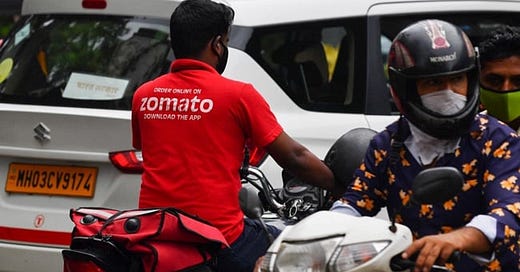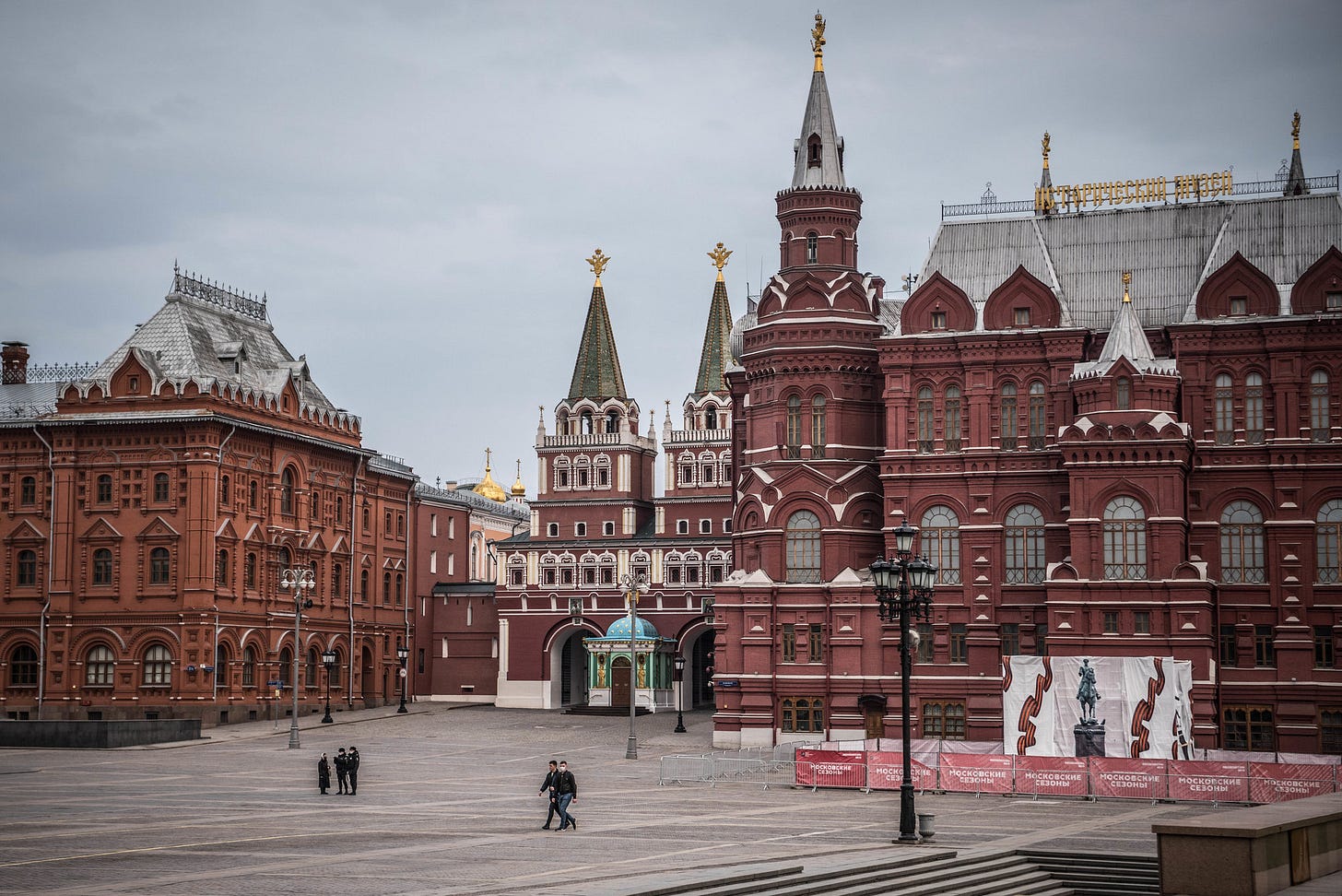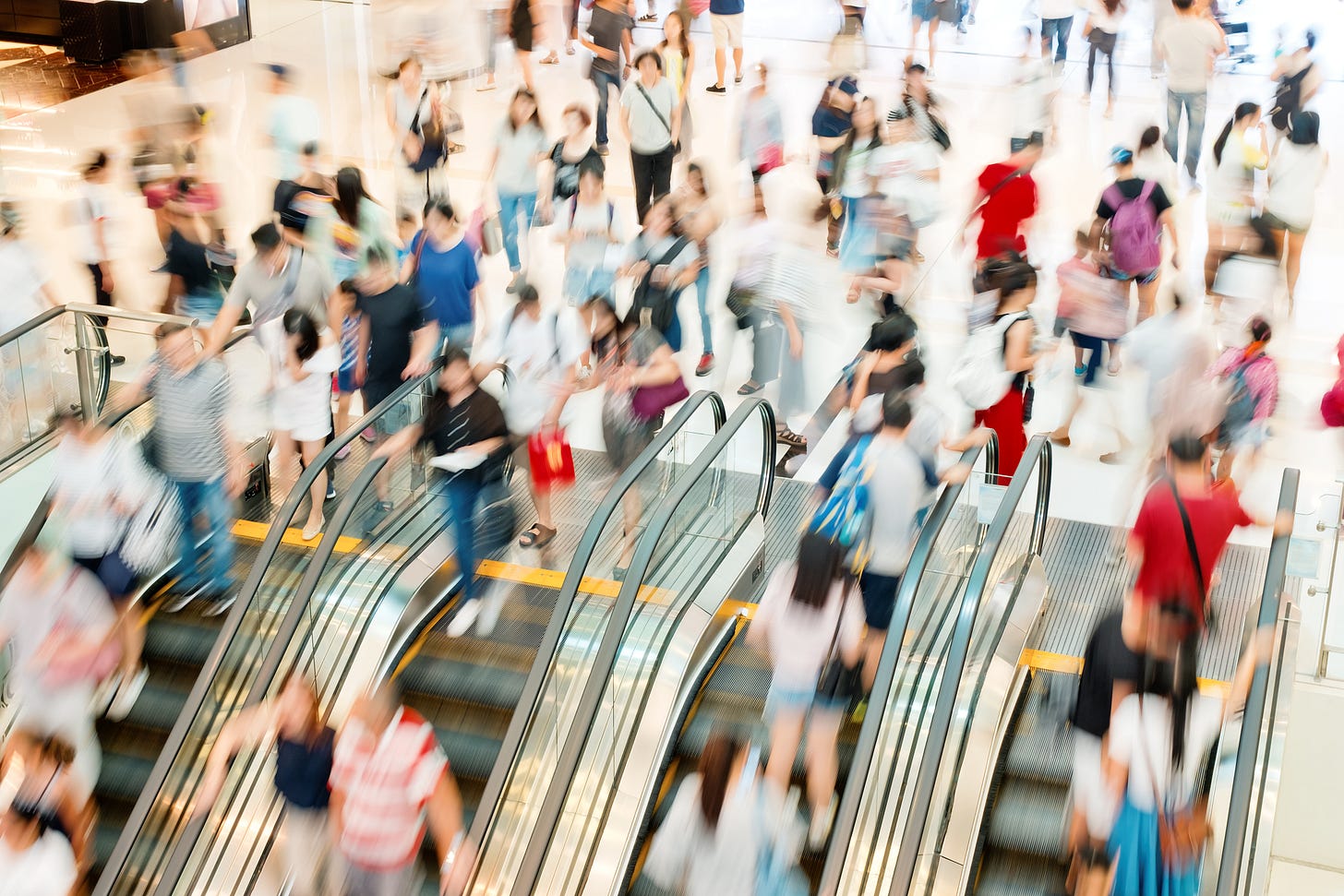Emerging Markets Daily - July 23
Zomato Soars in India Market Debut, Mexico's Middle Class, Russia Hikes Rates, Global Recovery Accelerates But Delta Looms, Amazon and Flipkart and India Courts
The Top 5 Emerging Markets Stories from Global Media - July 23
Zomato Soars to $12 Billion on Market Debut in India
Financial Times
”The Indian food delivery company Zomato saw its share price jump as much as 80 per cent on its market debut in Mumbai on Friday, as it became the first of the latest wave of tech start-ups to go public.”“Several other Indian tech companies, including the $16bn payments group Paytm, have been closely watching Zomato’s initial public offering to judge the appetite for other start-ups. Zomato’s shares surged to a high of Rs138.90 ($1.87) on the National Stock Exchange of India from their issue price of Rs76 in early trading on Friday, valuing the lossmaking company at about $12bn.”
“They closed at Rs125.85, up 65 per cent. India’s fast-growing tech groups have relied until now on foreign venture capital to fund their heavily cash-burning activities.”
“But regulatory changes allowing lossmaking companies to list in Mumbai have encouraged several start-ups to look at the public markets. ‘This is the first company in India, in my memory, that has gone for an IPO in India without turning a rupee of profit,’ said SR Srinivasan, an independent investment adviser. ‘It shows the level of maturity in the market. Hopefully, it’ll be positive, but I’m guarded.’”
“Demand for Zomato’s shares came despite an uncertain outlook for food delivery companies elsewhere. UK-based Deliveroo flopped on its debut in London, falling 26 per cent on its opening day, though the shares have since risen. Shares in other listed delivery companies, JustEat Takeaway, Doordash and Meituan, have all fallen over the past six months.”
“But it has been a rollicking year for Indian stocks, which have followed global equity markets to records this year. The BSE Sensex index has climbed more than 10 per cent, hitting an all-time high last week.” Benjamin Parkin reports.
Mexico’s Middle Class Faces Two Foes: Covid and Gov’t Policies
The Economist
“Fifteen years ago Maria, a school secretary, and her husband Samuel, a technician at an electronics firm, had just bought a car when they found out she was pregnant. They couldn’t afford the payments with a baby on the way, so they returned it. Today the couple and their three children live in a three-bedroom house in Tesistán in western Mexico, and have just bought a second set of wheels.”
“They eat out once a fortnight and have a subscription to Netflix, a video-streaming site. ‘My children used to ask me if we are poor and I would say ‘No, we have food, a roof over our heads, clothes, and we are moving ahead’, says Maria. ‘For me and my husband this is the best moment we’ve had yet.’”
“In recent decades Mexico, like many emerging markets, has witnessed the growth of its middle class. Incomes have risen—Maria and Samuel bring in around 20,000 pesos ($1,000) a month, an increase of more than 50% in real terms since they first got together 16 years ago. More people like them have bought cars, fancy tvs, smartphones and nice clothes. But recently the middle class, long neglected by politicians, has had two setbacks, thanks to covid-19 and the policies of President Andrés Manuel López Abrader.” The Economist reports.
Russia Hikes Rates By Largest in Seven Years to Tame Surging Inflation
Moscow Times
“Russia’s Central Bank has announced its largest interest rate hike in seven years as the regulator continues to struggle to tame surging inflation. At a rate-setting meeting in Moscow on Friday, the Central Bank decided to raise its key interest rate by a full percentage point, taking it back above pre-coronavirus levels to 6.5%.”
“The move of 100 basis points was the single biggest increase since the 2014 economic crisis when the Central Bank was grappling with tumbling oil prices, international sanctions and a rapidly devaluing ruble.”
“The Russian ruble strengthened slightly on the announcement, which was widely expected by markets following comments earlier in July by key bank officials about the possibility of a dramatic hike in a bid to quell surging inflation.”
“Russia’s inflation rate is currently running at a five-year high of 6.5% — well above the Central Bank’s 4% target — and has threatened to undermine political support for the Kremlin ahead of important parliamentary elections scheduled for September. Prices for stable goods are rising ‘substantially’ faster than 4% per year, the bank said in a statement.”
“Consumer demand is rising significantly faster than manufacturers’ production capacities given pandemic-related global supply chain disruption, the Central Bank said. It also said the exodus of labor migrants from Russia since the pandemic was creating employment shortages which push up wage demands, creating an inflationary cycle of higher spending by consumers and higher costs for businesses.” Moscow Times reports.
Global Recovery Accelerates, But Delta Variant Could Stall Growth
Wall Street Journal
“The global economy is expected to surge over the coming months as Europe begins to catch up with the U.S. and China, but the rapid spread of the Delta variant of Covid-19 could hold back—but not derail—the recovery.”
“Surveys of businesses from across Europe released Friday recorded the strongest increase in activity for more than two decades. That suggests the continent is set for the kind of growth already being experienced by the U.S.”
“But there are clouds on the horizon, with setbacks in Australia, India and other parts of Asia serving as a reminder that the pace of global economic recovery still depends on the course of the pandemic, and can be slowed by surges in infections as new variants emerge.”
“‘The survey also highlights how the Delta variant poses a major risk to the outlook,’ said Chris Williamson, chief business economist at IHS Markit, the data firm that compiles the surveys. ‘Not only have rising case numbers led to a slide in business optimism to the lowest since February, further Covid waves around the world could lead to further global supply-chain delays.’”
“IHS Markit said its composite Purchasing Managers Index for the eurozone—a measure of activity in the manufacturing and services sectors—rose to 60.6 in July from 59.5 in June, reaching its highest level in 21 years. A reading above 50.0 points to an increase in activity.”
“A similar survey from the U.S. to be released later Friday is expected to point to a slight easing of economic growth, but to a still-strong pace.” Paul Hannon reports.
Indian Court Dismisses Amazon, Flipkart Plea to Stall Antitrust Inquiry
The National/Reuters
“An Indian court on Friday dismissed appeals by Amazon.com and Walmart's Flipkart that sought to stall an antitrust investigation into their business practices, dealing a major setback to the US firms in a key market.”
“The Competition Commission of India (CCI) last year ordered an inquiry after allegations from brick-and-mortar retailers that the US firms promoted select sellers on their e-commerce platforms and used business practices that stifle competition.”
“The investigation was on hold for more than a year after companies challenged it, denying wrongdoing and arguing that the CCI lacked evidence, but a court allowed it to continue in June. On Friday, the High Court in southern Karnataka state rejected the US firms' appeals.”
"‘By no stretch of imagination can inquiry be quashed at this stage. The appeals are nothing but an attempt to ensure that action initiated by the CCI ... does not attain finality,’ a two-judge bench said while reading the decision in court. ‘The appeals are devoid of merit, and deserve to be dismissed.’” Reuters/The National report.





